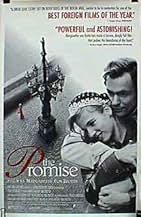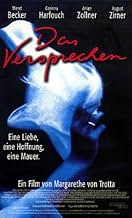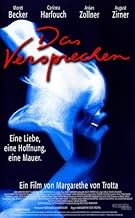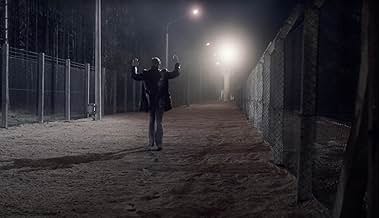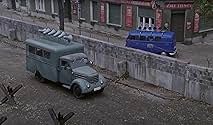VALUTAZIONE IMDb
6,7/10
948
LA TUA VALUTAZIONE
Cuando su pueblo se ve amenazado con el reasentamiento forzoso debido a la construcción de un embalse, una viuda de 80 años encuentra nuevas ganas de vivir y enciende el espíritu de resilien... Leggi tuttoCuando su pueblo se ve amenazado con el reasentamiento forzoso debido a la construcción de un embalse, una viuda de 80 años encuentra nuevas ganas de vivir y enciende el espíritu de resiliencia dentro de su comunidad.Cuando su pueblo se ve amenazado con el reasentamiento forzoso debido a la construcción de un embalse, una viuda de 80 años encuentra nuevas ganas de vivir y enciende el espíritu de resiliencia dentro de su comunidad.
- Regia
- Sceneggiatura
- Star
- Premi
- 4 vittorie e 3 candidature totali
Simone von Zglinicki
- Konrad's mother
- (as Simone von Zglienicki)
Joerg Meister
- Alexander - 20 years
- (as Jörg Meister)
Recensioni in evidenza
I can only praise the makers of this film, because many people did not experience it and unhappily, some do not want to hear about it. A female friend of mine recently told me, that now she knows why the Berlin Wall was built. Why, I asked. "Because the Russians didn't want the Americans to come in." It would be laughable, if it wasn't so sad. This is a person with university education and supposedly she never heard of people trying to get out of East Berlin or other communist countries. Most people form their opinions in their youth and many are not able to change their minds and admit to themselves, let alone to others, that they were wrong. Simply they ignore the facts. By the way, even after the wall went up, the Americans still could go to East Berlin, if they so desired. It was built to keep ordinary people in, because East Germans were leaving through Berlin in alarming numbers.
When the Berlin wall is built to split up the city, a group of youths try to escape from the East to the West. Among them are Sophie (Meret Becker) and Konrad (Anian Zollner), but only the former makes it to the west. Konrad stays in the East, becoming a successful astronomer. Over the following decades, the lovers keep on living their lives with new families, occasionally meeting each other when circumstances are benign. Older versions of Sophie and Konrad are played by Corinna Harfouch and August Zirner.
Through the melodramatic romance of Sophie and Konrad, the film examines the effects of the Wall on the Germans. Things are more complicated than "East is bad, West is good": there are movements to both directions, and people have many reasons to move, or to choose to stay. The film conveys the atmosphere of disunity and bureaucracy well through realistic visual style, but the love story is strong in its own right too.
Through the melodramatic romance of Sophie and Konrad, the film examines the effects of the Wall on the Germans. Things are more complicated than "East is bad, West is good": there are movements to both directions, and people have many reasons to move, or to choose to stay. The film conveys the atmosphere of disunity and bureaucracy well through realistic visual style, but the love story is strong in its own right too.
10sam89-1
I first saw this in a German language class, and even though I'm no where near fluent, I still find this to be more enjoyable and moving than many English movies. Following the lives of two main characters, the film chronicles the period just after the wall's construction to the fall in 1989. Though all protagonist characters are of course impacted negatively by the wall, the politics of a few characters are very complex and surprising. This movie will undoubtedly make you think. Aside from politics, the main plot is a love story, and it is very powerful. The characters are imperfect, real and delightful. All in all it is evocative, emotional, and never trite. Great film.
In an interview at the time of the release of this film Margarete von Trotta rather bragged about the fact that this was the first German (after unification) film after the fall of the Berlin wall that dealt with the 28 years of history on the East side of the wall. This remains to be seen, but if so, is that a good reason to come up with this dim, tepid and obligatory romantic drama that is predictable from scene 1? A drama in which the viewer no cliche spared?
The film looks more a kaleidoscope of political events in which the two main characters just happened to be a part of. The film never is a real drama and lacks every dramatic tension. The two main characters are simply boring people (not helped much by the casting); all other characters are one-dimensional. Some bad writing is also present: some characters, like the aunt, simply disappear from the story. As to direction and filmmaking there are plenty of uneasy moments as well. In the Prague scene the girl waits on the wrong spot for her friend; well, they just wait, but then "pop" a short scene in which she asks where this or that place is and then "pop": yes, there he is! The scene of the father in hospital also just seems to come from nowhere.
It all looks like as Von Trotta really wanted to show how very, very concerned she was about the 28 years of history and by that overplaying her hand. She should either have elaborated the drama more, or have taken the trouble for a more thorough interpretation of the political situation. As it is now it is a "everything political happens to poor us" drama. (5/10)
The film looks more a kaleidoscope of political events in which the two main characters just happened to be a part of. The film never is a real drama and lacks every dramatic tension. The two main characters are simply boring people (not helped much by the casting); all other characters are one-dimensional. Some bad writing is also present: some characters, like the aunt, simply disappear from the story. As to direction and filmmaking there are plenty of uneasy moments as well. In the Prague scene the girl waits on the wrong spot for her friend; well, they just wait, but then "pop" a short scene in which she asks where this or that place is and then "pop": yes, there he is! The scene of the father in hospital also just seems to come from nowhere.
It all looks like as Von Trotta really wanted to show how very, very concerned she was about the 28 years of history and by that overplaying her hand. She should either have elaborated the drama more, or have taken the trouble for a more thorough interpretation of the political situation. As it is now it is a "everything political happens to poor us" drama. (5/10)
10gonz30
THE PROMISE (Das Versprechen) by Margarethe von Trotta is must viewing. There is no easier and more entertaining manner to understand recent German, and Central European, history than by watching this film. It plays very well on video, and the interesting locales and action will excite those who dislike subtitles. THE PROMISE is an epic drama focusing on divisions: in love, in a nation, in its capital city, in its politics, and in love. Indeed a love story is the vehicle used for this extraordinary epic, recounting the three decades between the Berlin Wall's first barbed wire, and its fall. Some critics, forgetting what a historical epic requires, dismiss the film as cliche-ridden. Well, of course, "War and Peace", "Gone with the Wind", "Dr. Zhivago", were successful due to the use of composite characters or cliches. These are necessary to explain history in a medium like the cinema. Ms. von Trotta is to be congratulated not only for this and other great political films (i.e."Rosa Luxemburg") but for being one of the only German filmmakers to tackle the controversial topic of German reunification. A declared socialist from Western Germany, Ms von Trotta lends the film a point of view that is as unbiased as I can imagine. Don't miss it. A lot of people did because of the film's timing. The last thing I guess most Germans wanted to see at the movies in 1994 was a reminder of the results of reunification. For this reason, this great film was unfairly denied its place in European Film History.
Lo sapevi?
- Citazioni
[When the Berlin Wall comes down]
Woman: When the cage opens after thirty years, you can't fly anymore.
- ConnessioniFeatured in Die Neugier immer weiter treiben (1995)
I più visti
Accedi per valutare e creare un elenco di titoli salvati per ottenere consigli personalizzati
- How long is Das Versprechen?Powered by Alexa
Dettagli
Botteghino
- Lordo Stati Uniti e Canada
- 91.145 USD
- Tempo di esecuzione1 ora 55 minuti
- Colore
- Mix di suoni
- Proporzioni
- 1.66 : 1
Contribuisci a questa pagina
Suggerisci una modifica o aggiungi i contenuti mancanti




